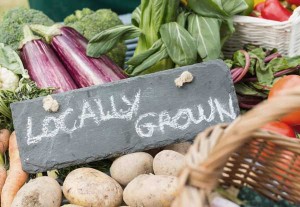 One aspect I love about the Polack Food Bank is our commitment to feeding our neighbors in a way that strengthens the local economy and community. I believe that serving vulnerable individuals should not come at the expense of other vulnerable parties. I am proud of all the work JFS has done to achieve this and am excited by the prospect of furthering our efforts to source affordably and ethically.
One aspect I love about the Polack Food Bank is our commitment to feeding our neighbors in a way that strengthens the local economy and community. I believe that serving vulnerable individuals should not come at the expense of other vulnerable parties. I am proud of all the work JFS has done to achieve this and am excited by the prospect of furthering our efforts to source affordably and ethically.
Forming Partnerships That Benefit Clients and Community
JFS has long-standing business partnerships with organizations such as Central Co-op and Oxbow Organic Farms. At Central Co-op, every time you round up at the register, a donation is made to the Food Bank. JFS then receives Co-op credit, which we use to buy high-quality food for our clients. This benefits the store by creating additional sales, which then cycle back into the community via fair wages, local sourcing and owner dividends. Our partnership with Oxbow Farms provides discounted fresh, organic produce delivered right to the Food Bank. Our standing order also guarantees a small, local farm a reliable order every week, creating some stability in an often unpredictable market.
Stocking Culturally Appropriate Food
A large part of creating food access is ensuring that the food we provide is both feasible for clients to transport and prepare and culturally appropriate. Because our neighborhood Food Bank is so close to the International District, we serve a large Asian immigrant population. Many of these clients are elderly, and have either aged out of the work force or have no family in the area to assist them. To better serve them, we teamed up with Uwajimaya. Their donations include soup mixes, sauces, soy products and produce. We often receive these groceries the day before our International District home delivery run, and I appreciate being able to include these extra culturally appropriate food items.
![The Polack Food Bank recently received Buddha’s hand fruit. Image by By Kaldari (Own work) [Public domain], via Wikimedia Commons.](http://blog.jfsseattle.org/wp-content/uploads/2016/02/Buddhas_hand_1-Kaldari-web.jpg)
Image by By Kaldari (Own work) [Public domain], via Wikimedia Commons.
Offering varied food options is just one way in which we strive to cultivate a dignified experience. Of course, the most important experience we offer is direct service to clients. Our onsite Food Bank is open three days each week. And monthly, we offer a special pop-up Russian Food Bank in Bellevue and an after-hours Kosher Food Bank at our Capitol Hill Campus.
We hold free monthly cooking classes focusing on simple, affordable and healthy recipes. The cooking classes, organized by our Food Bank team and led by a nutritional educator, create both a social and instructional forum. Clients chat while they learn about nutrition and food preparation. Healthy eating can be less expensive when you learn how to use simple ingredients to create a good meal! At the end of the class, we all share dinner. Students go home with a grocery bag of ingredients and the recipe, so they can recreate the meal. It is a joy and privilege to be part of this community.
Our recipes come from Leanne Brown’s wonderful Good and Cheap, a cookbook for eating well on a tight budget. We love the book, because in addition to affordable and simple recipes, Brown includes tips for stocking a pantry, shopping seasonally and making the most of your food; basic building blocks for any at-home chef! Try the delicious pasta with eggplant and tomato recipe, or her chocolate zucchini muffins, and you’ll see that simple, tasty, healthy food is an attainable option – even when you’re watching your wallet.
 By Esther Magasis
By Esther Magasis
Esther loves her job as the Food Bank Manager at JFS and is passionate about the evolution of our food systems to be just, sustainable and healthy. When she is not at work she is usually still thinking about food; whether it be cooking, eating, growing, or industrial and economic reform.



